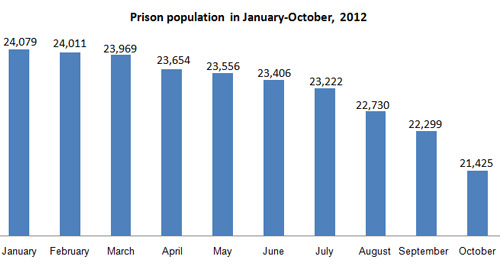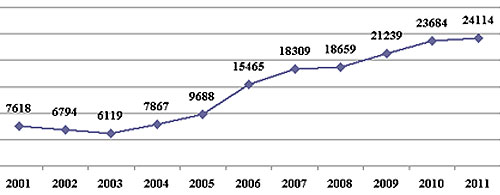| Law on Amnesty Passed with First Reading |
| Civil Georgia, Tbilisi / 8 Dec.'12 / 16:58 |

Georgia’s prison population per month between January and October, 2012. Source: Georgian state statistics office Geostat
Parliament passed on December 7 with 83 votes to 10 draft law on amnesty with its first reading.
The draft envisages several forms of amnesty for inmates such as complete exemption from punishment; halving of prison sentence or reducing it either by one-third or by one-forth for broad range of crime categories.
According to the draft, those 190 inmates, who were recognized by the December 5 resolution of the Parliament as political prisoners, should be released.
According to tentative figures from the ministry of penitentiary, as a result of proposed amnesty up to 3,000 inmates will be released, but more exact figures is expected at the time when lawmakers start discussing the draft article-by-article during its second reading.
In addition about 5,500 inmates, or even more (possibly 6,000), will become allegeable to apply for pre-term release because their prison terms will be halved or reduced either by one-third or by one-fourth as a result of the proposed amnesty. Mechanism for pre-term release does not mean that these inmates will be automatically released; their cases should be reviewed individually by a special commission.
Georgia’s prison population, one of the highest in terms of per capita in the world, started to decline from the beginning of this year from over 24,000 in January to 21,425 in October.
The figure apparently continued its downward trend in November too as some inmates were released either through pre-term release mechanism or presidential pardon.
The proposed draft of amnesty envisages complete exemption from punishment those inmates, who are convicted for the first time for intentional, less grave crimes. The draft, however, lists categories of crimes which will not fall under the amnesty; among these exceptions are crimes related to: less grave crimes that led to loss of human life; intentionally inflicting serious bodily injuries; sexual assault; crimes against human rights and freedoms; engaging of a juvenile in prostitution and forcing someone to engage in prostitution; substitution of one child for another; crimes against the state; exceeding or abuse of official powers; coaxed and coerced testimony; hindering legal proceedings or inquiry; concealing and not reporting crimes.

Georgia’s prison population per year between 2001-2011. Source: Georgian state statistics office Geostat
According to the draft law, release from prison will be granted to those who committed “less grave” crimes while being under age 18; but the amnesty will not apply to those crimes, which led to a person’s death.
The draft will also grant complete exemption from punishment those convicted for crimes caused by reckless imprudence, but the draft excludes those cases when such crimes caused loss of human life.
There will be a complete exemption from punishment for those inmates, who have no previous crime record but are now convicted for either plotting or attempting to commit “less grave and/or grave crimes”.
There will also be a complete exemption from punishment, according to the draft, for those who had no previous crime record but are now convicted for drug-related crimes; but it will not apply to such crimes which are related to illicit drug trade.
Complete exemption from punishment will also be granted to those who were convicted for resisting police or other authorities.
The draft envisages halving of prison sentence for those who have committed “grave and especially grave crimes” while being under age 18 and who have no previous crime record.
Halving of prison sentence is also envisaged for inmates convicted for crimes related to: misappropriation; wittingly buying or selling stolen items; violation of excise rules; illegal gathering or disseminating confidential commercial or banking information; bribing organizer or participant of sport or entertaining competitions; misuse of state loans; forged credit cards; violation of customs rules; tax evasion; illicit possession or carrying of firearms; drunken driving that led to less serious injuries; violation of safety norms at energy facilities that led to loss of human life or other grave consequences; forging prescription for the purpose to illegally obtain drugs; false testimony.
It also envisages reducing prison sentences by one-third for those female prisoners, who were convicted for “grave and especially grave crimes”; this provision will not apply to those crimes which led to a person’s death.
The draft envisages reducing of prison term by one-fourth to inmates, who are not convicted for murder, sexual assault; terrorism and crimes which carry life imprisonment.
PM Bidzina Ivanishvili said last month that amnesty could “at some point” lead to increase in crime rate “to a certain extent”; he said: “The society should meet it with understanding.”
Speaking with journalist on December 8, after meeting with lawmakers from his Georgian Dream parliamentary majority, PM Ivanishvili reiterated those remarks by saying that “small part” of those inmates who would be released as a result of amnesty “will still continue doing for what they were imprisoned”, which might lead to increase of crime rate for “several days”. “And the society should meet it with understanding… as this process of [amnesty] is a human act,” PM Ivanishvili said and added that possible increase in crime rate would not last long.
Georgian Dream lawmaker, Koba Davitashvili, has proposed to pass a legislative amendment that will automatically apply aggravating factor if a crime is committed by a person to whom an amnesty was granted.
